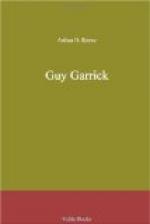He was off a few minutes later, as fresh as though he had been on a vacation instead of plunged into the fight of his life. I followed him, more leisurely, and then rode down in the infernal jam in the subway to execute his commission.
Then for an hour or two I fidgeted impatiently in his office waiting for him, until finally he came downtown in the racing car which Warrington had placed at his disposal.
He said nothing, but it was all the same to me. I had reached that nervous state where I craved something doing, as a drug-fiend craves the dope that sets his brain on fire again.
I did not ask where he was going, for I knew it intuitively, and it was not long before we were again in the part of the city where the gangster’s garage was located.
We stopped and Garrick beckoned to an urchin, a couple of blocks below the garage.
“Do you want to make a dollar, kid?” he asked, jingling four quarters enticingly.
The boy’s eyes never left the fist that held the tempting bait. “Betcherlife,” he answered.
“Well, then,” instructed Garrick, “take these newspapers. I don’t want you to sell any of them on the street. But when you come to that garage over there—see it?—I want you to yell, ’Extra— special extra! All about the great gambling exposure. Warrants out!’ Just go in there. They’ll buy, all right. And if you say a word about anyone giving you these papers to sell—I’ll chase you and get back this dollar to the last cent. You’ll go to the Gerry Society—get me?”
The boy did. The bait was as alluring as the threat terrible. After Garrick had given him final instructions not to start with the papers for at least five minutes, we slipped quietly around the next street and came out near the Old Tavern, but not in front of it.
Garrick left the car—I had been riding almost on the mud guard— in charge of Warrington’s man, who was to appear to be tinkering with the engine as an excuse for waiting there, and to keep an eye on anything that happened down the street.
We made our way into our room at the Tavern with more than ordinary caution, for fear that something might have been discovered. Apparently, however, the discovery of one detectaphone had been enough to disarm further suspicion, and the garage keeper had not thought it necessary to examine the telephone wires to see whether they had been tampered with in any way. The wire which he had thought led to the warehouse had seemed quite sufficient to explain everything.
In the room which we had used so much, we found the other detectaphone working splendidly. Garrick picked it up.
By the sound, evidently, someone in the garage was overhauling a car. It may have been that they were fixing one up so that its rightful owner would never recognize it, or they may have been getting ready to take one out. There was no way of determining.
We could hear one of the workmen helping about the car, a man whom we had listened to when the instrument first introduced us to the place. The second machine, connected with the telephone, did not transmit quite as clearly as the broken detective device had done, but it served and, besides, we could both hear through this and could confirm anything that might be indistinct to either of us alone.




